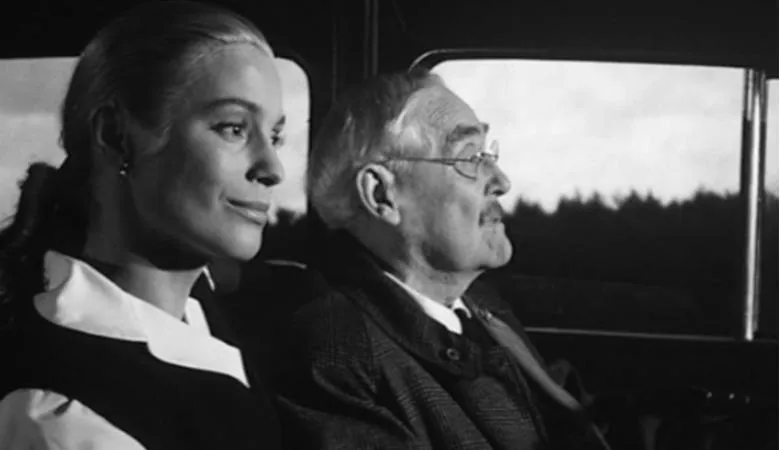A series of events organised by SAACY (The Sciences of Ageing and the Culture of Youth) and facilitated by the Centre for Humanities and Health.
As part of the current research programme, The Sciences of Ageing and the Culture of Youth (SAACY), we are screening a series of films which deal with aspects of the ageing process. At SAACY, we’re interested in the ways that we view and talk about growing up and getting older. In particular, we want to explore how our understanding of the science of the ageing process influences our attitudes towards ourselves and each other at different stages of life, including a pessimism about getting old.
We want our Getting Older Film Club to be a space to come together to consider the diverse ways that the ageing process has been depicted on the big screen and to carry on some of the conversations we’ve been having as part of SAACY. The series is co-organised by Joe Wood, research associate on the project, and Eduardo Correia, our affiliate researcher. Screenings take place on the Strand campus in room K-1.56 and wine and snacks are kindly provided courtesy of the Centre for Humanities and Health. All screenings are free and open to all – if you’re not from King’s email Joe (joe.a.wood@kcl.ac.uk) to be added to the guest list.
Wild Strawberries (Sweden, 1957)
We’ve already had a great session watching Ingmar Bergman’s Wild Strawberries. A true cinema classic, the film follows Isak, a retired professor, as he’s driven from Stockholm to Lund to receive a tribute from his old hometown. Intercut with Isak’s memories from his youth (or are they fantasies?) and filmed in crisp black and white, the film reflects on memory, imagination and the anticipation of death in older age.
It was a great start to the series and conversation after the film was wide-ranging. We all had a strong reaction Bergman’s insistent implication of Isak’s proximity to death, including the famous dream sequence in which he seems to witness the wheels (literally) coming off his own funeral procession. Others felt moved by the ambiguity of his friendship with his daughter-in-law, married to his son who seems to be making the same mistakes as he did, and Bergman’s repeated close-up juxtaposition of the textures of young and old faces on the big screen. Some of the frustrated sexual energy latent in much of the film even led one participant to describe a similar involuntary sexual frisson felt as a young doctor on a ward full of older people. There is a power imbalance – based perhaps on an unequal vitality – in some intergenerational encounters that permits a playful ironic flirtatiousness. When one of Bibi Andersson’s two characters in the film inverts the classic Romeo and Juliet balcony scene by bidding farewell to Isak by shouting up that he’s the one she will always love, she can only say this - both with love and in jest - because he’s old.
Privilege (USA, 1990)
Our next film was Privilege, an experimental documentary by Yvonne Rainer. Inspired in part by the term intersectionality, coined by Kimberlé Crenshaw 1989, the film starts by exploring the menopause and the silence that often surrounds this part of the female ageing process. Rainer then opens up the documentary to explore the way prejudices and privileges intersect and suppress certain experiences and exercises of power.
A rarely seen video-essay, Privilege seemed at once cutting edge in it’s immediate concerns, but also a distillation of a certain set of attitudes held by Rainer and her peers in the late 80s. Their New York feminist lesbian artistic circles were based on groups formed in the 1960s and, for some of us, it seemed strange that there is no mention of the HIV/AIDs epidemic dominating medicine at the time. For others, Rainer’s use of now antiquated-looking Mac computers worked as an allegory for the way the menopause can halt experiences of being desired, just like the tech in the film has been superseded by brighter smaller models. Nevertheless, it remains a very angry film that still finds a furious vitality, despite being pretty stagey, in its overlapping voices and straight to camera monologues from writers like Joan Nestle, Nicholasa Morh and Frantz Fanon
Coming Soon
Our next session on March 9 is a more light-hearted double bill of documentaries from the final decades of the last century which trace some of the possibilities of beauty, vitality and solidarity in older age. One of them, Three Salons at the Seaside, was named one of the best documentaries of the last 50 years by the Grierson Trust and recently spoofed in an episode of Documentary Now with, somewhat surprisingly, Cate Blanchett and Harriet Walter.
We end this semester with a film from Hollywood’s Golden Age that Leo McCarey felt was his best. Make Way for Tomorrow deals with a couple dealing with involuntary retirement and struggling to afford their life together. It has McCarey’s trademark mix of plangent humour and real-life concerns.
Look out for a continuation of the Getting Older Film Club later in 2023. We’re finalising our schedule but will definitely be showing Naomi Kawase’s The Mourning Forest which we couldn’t screen this semester because of strike action. Other films might include 1970s sci-fi Logan’s Run, the more realistic recent Japanese dystopia of Plan 75, French menopause comedy Aurore!, Y2K puberty horror Ginger Snaps, or classics like Amour, Harold and Maude and Fear Eats the Soul. Check out the SAACY events page for more information.

